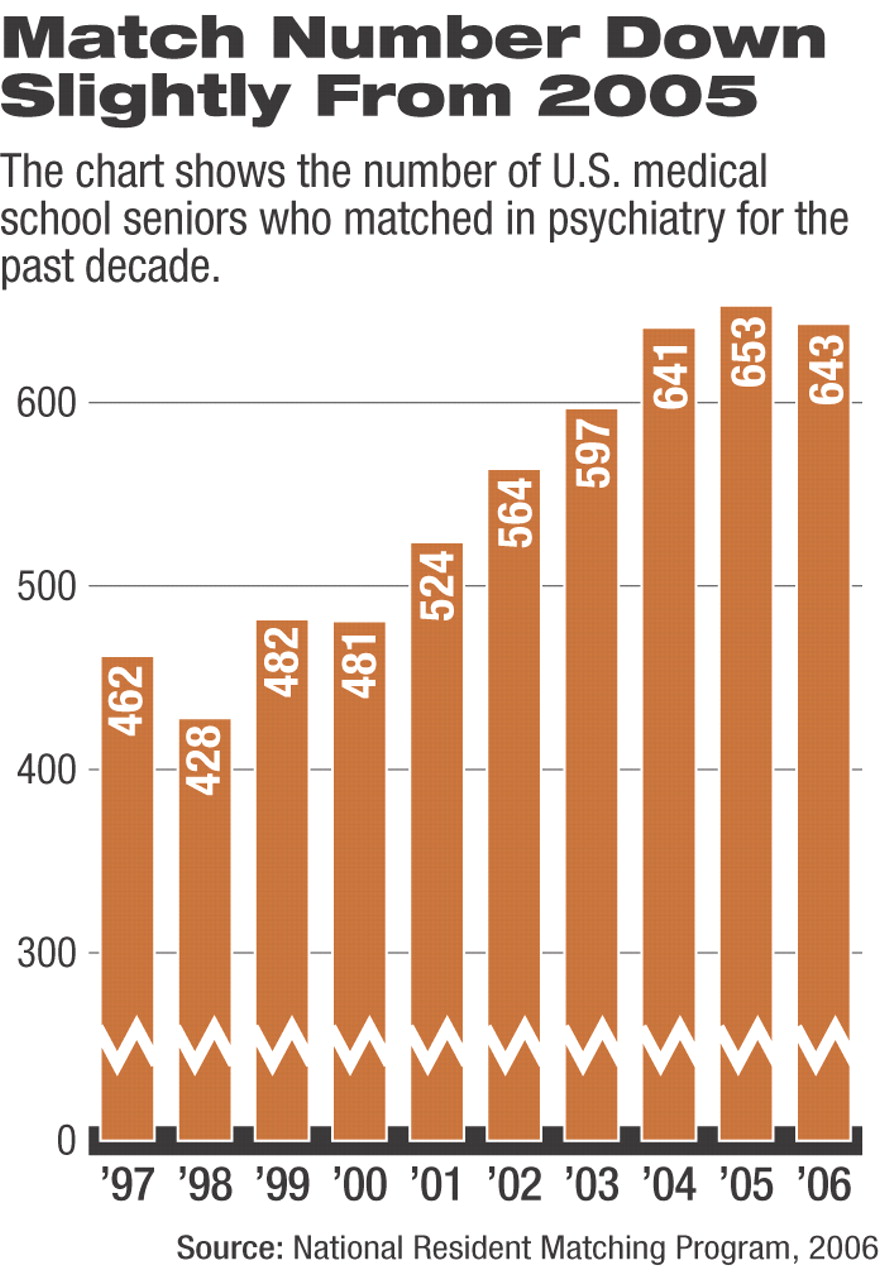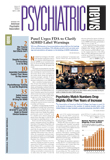A total of 983 medical school graduates will enter PGY-1 general psychiatry residency programs this summer, according to the National Resident Matching Program (NRMP).
Of those 983, there were 643 U.S. medical graduates who“ matched” into psychiatry residency programs around the country. That number is down slightly from last year's figure of 653 (see chart).
In addition to the 643 U.S. medical graduates, 340 students—including mostly international medical graduates (IMGs), Canadian students, and U.S. students who graduated in previous years—also filled slots this year, for a total of 983.
The figures for psychiatry represent a leveling off of U. S. medical student interest in psychiatry after a steady, albeit slow, increase in the previous five years.
Figures for U.S. students matching into double-board programs are off slightly from the preceding year. The number of students entering medicine/psychiatry programs fell from 12 to eight, as did the number entering psychiatry/family medicine programs. However, the number matching into triple-board pediatrics/psychiatry/child psychiatry programs increased from 16 to 18.
Finally, three U.S. seniors matched into PGY-2 programs, down from four last year. The net change in U.S. seniors entering all psychiatry programs this year is a reduction of 17 from last year.
Because match results reflect the fields of medicine preferred by tomorrow's doctors, they are watched like tea leaves by educators and policymakers. Psychiatrist Sidney Weissman, M.D., who has maintained an active interest in workforce and training issues for many years and is the Area 4 trustee on APA's Board of Trustees, suggested that psychiatry's steady climb in interest among medical students in the past decade may have reached a plateau.
He said that without vigilance on the part of psychiatric educators, numbers could begin to fall again—as they had done in the late 1980s—as students gravitate toward high-paying specialties such as anesthesiology and radiology. Weissman said that one area that could be especially important is psychiatric involvement in the structure of the psychiatry curriculum in medical school and in the selection of medical students.
It is an area that is especially ripe since the Association of American Medical Colleges has begun to push for a 30 percent increase in the number of medical student slots in the United States to help forestall a projected physician shortfall in 2020.
“To accomplish this recruitment of medical students, new schools will need to be formed and existing schools expanded,” he said. “Major reform will be needed in medical school curricula as well in assessing appropriate undergraduate training of U.S. medical school applicants. These proposed changes will give psychiatry an opportunity to assist in these critical activities. We can help develop new ways to make the medical school curriculum more involved in psychiatry. We can further aid in the reexamination of the criteria for acceptance to medical school and ensure that applicants who are interested in psychiatry and meet other qualifications can or will be accepted.
“If we are to maintain the numbers of U.S. students entering our field, we will need to work on those areas of career choice where we can have an impact,” he said. “These are the structure of the psychiatry curriculum and the selection of medical students.”
Weissman is director of psychiatry residency training at Northwestern University School of Medicine.
More generally, Weissman has continually stressed over the years that the most important goal for the profession in terms of attracting students is to define clearly the “biopsychosocial” nature of psychiatry. And he reiterated the dependence of the American health care system on international medical graduates (IMGs), with one-fifth of all residency slots and one-third of all psychiatry slots being filled by IMGs.
The NRMP is a private, not-for-profit organization established in 1952 to provide “an orderly and fair mechanism” to match the preferences of applicants to U.S. residency positions with the preferences of residency program directors for those applicants. The NRMP is sponsored by the American Board of Medical Specialties, the AMA, the Association of American Medical Colleges, the American Hospital Association, and the Council of Medical Specialty Societies.
More information about the match and results for all specialties is posted online at<www.nrmp.org>.▪

